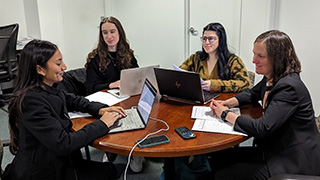Seton Hall Law Awarded More Than $1.6M From NJ State Bar Foundation
Wednesday, March 13, 2024

Pictured (L to R): Kunjan Patel, 3L; Bailey McNamara, 3L; Jamie Mitrovic, 3L; Amelia Wilson, assistant clinical professor.
Seton Hall University School of Law has been awarded more than $1.6 million in grants from the New Jersey State Bar Foundation. The funding is spread out over several years and will support the law school’s clinical programs at the Center for Social Justice, including the Family Law, Equal Justice and Immigrants’ Rights Clinics as well as a new Transactional Law Clinic that will allow students to work with area nonprofits and small for-profits in business formation, contracts and other essential services.
"Seton Hall Law School is grateful for the significant, multi-year support of the New Jersey State Foundation," said Interim Dean John Kip Cornwell. "With this funding, we will develop new transactional clinics, strengthen our existing programs, expand our outreach in the community and give our students more of the real-life legal experience that is one of the hallmarks of a Seton Hall Law School education."
Lori Outzs Borgen, director of the Center for Social Justice, which houses the legal clinics at Seton Hall Law, agreed, "Over the past two decades, the New Jersey State Bar Foundation has provided invaluable support to the Center for Social Justice, enabling us to train more law students and provide crucial support to the community. Our partnership connects us closely with the New Jersey bar and helps us further the Foundation’s mission to serve the public. This funding will allow us to train more law students and attorneys, provide more clinical legal services and educate New Jersey residents about their legal rights."
In a release announcing this grant along with similar grants to other law schools, Charlie Stoia, J.D. ’88 president of the New Jersey State Bar Foundation, said, "Clinics give law students practical experience in providing legal aid in the areas of public service, social justice, gender justice, family law, mediation, entrepreneurship and more. We are thrilled to provide funding to help prepare students for the practice of law."
For more than fifty years, Seton Hall Law School has offered clinical courses to train law students while providing free legal services to the community. In 1970, the law school established its first free legal assistance program, The Legal Services Clinic, in conjunction with Essex-Newark Legal Services.
The commitment to serve the community through clinical legal education developed further over the years, and in 1991 Seton Hall Law School established the Center for Social Justice (CSJ) as a public interest law firm for the disadvantaged and underrepresented. Over the ensuing span of more than three decades, CSJ and its student practitioners have represented thousands of clients, set numerous precedents that have impacted the lives of thousands more, and have authored ground-breaking reports that have led to substantive changes in the law.
Kazel Kapadia, a third-year student at Seton Hall Law working under Clinical Law Professor Amelia Wilson, noted, "The Immigrants' Rights Clinic provides me with the opportunity to learn from expert immigration attorneys, dissect a complex area of law and zealously advocate for my clients. Without the legal representation the clinic provides, clients, especially those of color, face deportation at exceedingly high rates."
Crystal Paulino, also a 3L working this year in the Immigrants’ Rights Clinic, added, "The absence of a right to government-appointed counsel in immigration proceedings illustrates the crucial role our clinic plays in ensuring access to justice for vulnerable individuals. Without our representation, clients may be forced to face the complexities of removal proceedings alone. Compounded by the language barrier many clients face, the prospect of navigating this legal landscape without representation is unsettling."
Categories: Education, Law, Research






